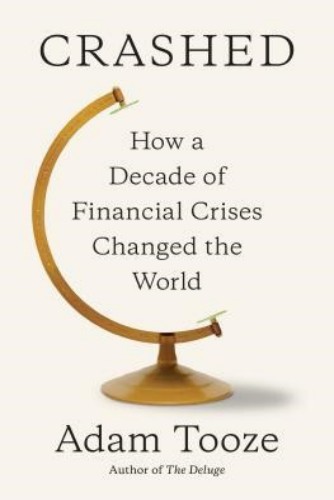
Crashed
How a Decade of Financial Crises Changed the World
کتاب های مرتبط
- اطلاعات
- نقد و بررسی
- دیدگاه کاربران
نقد و بررسی

May 21, 2018
Columbia history professor Tooze (The Deluge) recounts and analyzes the continuing repercussions of the 2008 economic crisis in this dense, but accessible, book. Although he presents more information than most readers will require (including a chart titled, “Demand for Dollar Funding in the European Central Bank’s One-Month Auctions”), Tooze makes the arcana of international economic policy relevant to a lay audience by framing his account with Donald Trump’s political ascension. He walks through the significant financial crises of the previous 10 years, not neglecting those possibly less familiar to Americans than Lehman Brothers’ collapse, such as the debt crisis in Greece and Ireland. Tooze amasses telling details from the bailout of the big banks (for instance, that they more than doubled their funding advantage relative to small banks after the crisis) to bolster his contention that Trump’s surprise electoral victory was rooted in the U.S. government’s response to the 2008 meltdown. Those government policies gave “absolute priority to saving the financial system” and disregarded “the arrow of causation,” reshaping American politics and setting the stage for a populist backlash. In addition to making international economics understandable and attention grabbing, Tooze has written an essential addition to the ranks of histories that place Trumpism in context.

June 1, 2018
What happens when the walls of Wall Street come crashing down? Donald Trump, for one thing. A long but not oppressive study blending politics, economics, and history.Tooze (History/Columbia Univ.; The Deluge: The Great War, America and the Remaking of the Global Order, 1916-1931, 2014, etc.), whose previous book won the Los Angeles Times Book Prize, examines the "first crisis of a global age" as it played out in an increasingly interlocked financial world. One driver was the deregulation of financial institutions, which was not confined to the United States. As the author notes, deregulation was central to the British plan to convert London into ground zero for "many of the most fast-paced global transactions" that were remaking the world. Tooze complicates the usual narratives. While many writers, especially on the right, have pegged the financial meltdown on the subprime mortgage crisis, agencies such as Freddie Mac and Fannie Mae in fact kept loans to high standards, and that aspect of the larger financial crisis proved more symptom than cause. Still, those mortgages worked to distort the market, and "when you distort the market, crises are inevitable." One unintended effect of the rattling of capital was the strengthening of Russia, whose "new prosperity was associated not with independence from the world economy but with entanglement in it," and China, whose economy responded "in directions that the Beijing leadership had been struggling to counteract." Some of the broader consequences were more profound, including a schism between globalists and protectionists in the U.S. and Europe--a schism that, by Tooze's account, resulted a decade later in Brexit, the election of Trump (whose "objectionable personality and outlandish policy proposals now had to be weighed against the more basic political question of who could do what for whom"), and the rush to once again deregulate the very forces that had set off the crisis in the first place.First-rate financial history and an admirable effort to wrestle a world-changing series of events between covers.
COPYRIGHT(2018) Kirkus Reviews, ALL RIGHTS RESERVED.

July 1, 2018
Wolfson Prize winner Tooze looks at the 2008 economic crisis, which not only reconfigured financial markets worldwide but led to political destabilization, with war in Ukraine, upheaval in Greece, Brexit, and more. Did it have to happen? And does a ripple effect continue?Debut novels from authors who have won prizes for their short fictionCoauthored chills that will keep you reading long into the summer night
Copyright 2018 Library Journal, LLC Used with permission.

Starred review from July 1, 2018
Tooze (history, Columbia Univ.; The Deluge) combines an economic history with geopolitical analysis of the 2008 financial crisis and the subsequent decade. After detailing the preceding economic climate of a roaring housing market, financial deregulation, and emerging Eastern European economies, the author recounts how those responsible struggled to contain multiple crises in the transatlantic dollar-based financial system, the Eurozone, and post-Soviet Eastern Europe. Resulting government budget deficits brought pressure to impose austerity too early, which made the recovery agonizingly protracted and incomplete. The author goes on to elaborate on the impact of internal politics on government responses and how global markets forced policy decisions on governments, encompassing the Lehman failure, Greek debt, the Ukraine crisis, Brexit, nationalism, protectionism, wealth inequity, the 2015 Chinese market sell-off, and belligerent populism as voiced by President Trump. In sum, the decade's crises came suddenly and with those in charge wholly unready. VERDICT An important and insightful work that, while eminently readable, is most suitable for informed readers wanting an in-depth treatment of the subject. [See Prepub Alert, 2/26/18.]--Lawrence Maxted, Gannon Univ. Lib., Erie, PA
Copyright 2018 Library Journal, LLC Used with permission.

























دیدگاه کاربران